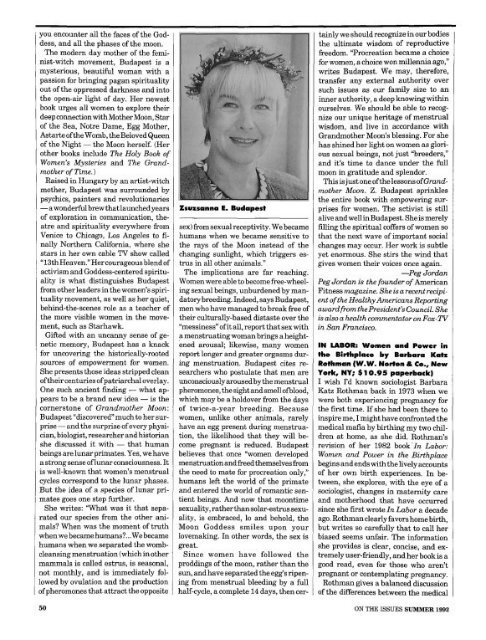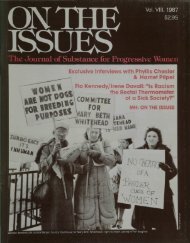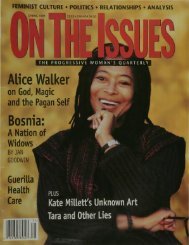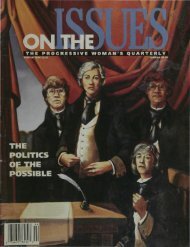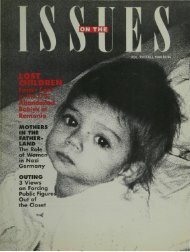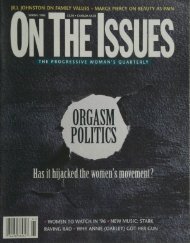300 Years & Counting 1H KILLS - On The Issues Magazine
300 Years & Counting 1H KILLS - On The Issues Magazine
300 Years & Counting 1H KILLS - On The Issues Magazine
Create successful ePaper yourself
Turn your PDF publications into a flip-book with our unique Google optimized e-Paper software.
you encounter all the faces of the Goddess,and all the phases of the moon.<strong>The</strong> modern day mother of the feminist-witchmovement, Budapest is amysterious, beautiful woman with apassion for bringing pagan spiritualityout of the oppressed darkness and intothe open-air light of day. Her newestbook urges all women to explore theirdeep connection withMother Moon, Starof the Sea, Notre Dame, Egg Mother,Astarte of the Womb, the Beloved Queenof the Night — the Moon herself. (Herother books include <strong>The</strong> Holy Book ofWomen's Mysteries and <strong>The</strong> Grandmotherof Time.)Raised in Hungary by an artist-witchmother, Budapest was surrounded bypsychics, painters and revolutionaries—a wonderful brew that launched year sof exploration in communication, theatreand spirituality everywhere fromVenice to Chicago, Los Angeles to finallyNorthern California, where shestars in her own cable TV show called"13th Heaven." Her courageous blend ofactivism and Goddess-centered spiritualityis what distinguishes Budapestfrom other leaders in the women's spiritualitymovement, as well as her quiet,behind-the-scenes role as a teacher ofthe more visible women in the movement,such as Starhawk.Gifted with an uncanny sense of geneticmemory, Budapest has a knackfor uncovering the historically-rootedsources of empowerment for women.She presents those ideas stripped cleanof their centuries of patriarchal overlay.<strong>On</strong>e such ancient finding — what appearsto be a brand new idea — is thecornerstone of Grandmother Moon:Budapest "discovered" much to her surprise— and the surprise of every physician,biologist, researcher and historianshe discussed it with — that humanbeings are lunar primates. Yes, we havea strong sense of lunar consciousness. Itis well-known that women's menstrualcycles correspond to the lunar phases.But the idea of a species of lunar primatesgoes one step further.She writes: "What was it that separatedour species from the other animals?When was the moment of truthwhen we became humans?.. .We becamehumans when we separated the wombcleansingmenstruation (which in othermammals is called estrus, is seasonal,not monthly, and is immediately followedby ovulation and the productionof pheromones that attract the oppositeZsuxsanna E. Budapestsex) from sexual receptivity. We becamehumans when we became sensitive tothe rays of the Moon instead of thechanging sunlight, which triggers estrusin all other animals."<strong>The</strong> implications are far reaching.Women were able to become free-wheelingsexual beings, unburdened by mandatorybreeding. Indeed, says Budapest,men who have managed to break free oftheir culturally-based distaste over the"messiness" of it all, report that sex witha menstruating woman brings a heightenedarousal; likewise, many womenreport longer and greater orgasms duringmenstruation. Budapest cites researcherswho postulate that men areunconsciously aroused by the menstrualpheromones, the sight and smell ofblood,which may be a holdover from the daysof twice-a-year breeding. Becausewomen, unlike other animals, rarelyhave an egg present during menstruation,the likelihood that they will becomepregnant is reduced. Budapestbelieves that once "women developedmenstruation and freed themselves fromthe need to mate for procreation only,"humans left the world of the primateand entered the world of romantic sentientbeings. And now that moontimesexuality, rather than solar-estrus sexuality,is embraced, lo and behold, theMoon Goddess smiles upon yourlovemaking. In other words, the sex isgreat.Since women have followed theproddings of the moon, rather than thesun, and have separated the egg's ripeningfrom menstrual bleeding by a fullhalf-cycle, a complete 14 days, then certainlywe should recognize in our bodiesthe ultimate wisdom of reproductivefreedom. "Procreation became a choicefor women, a choice won millennia ago,"writes Budapest. We may, therefore,transfer any external authority oversuch issues as our family size to aninner authority, a deep knowing withinourselves. We should be able to recognizeour unique heritage of menstrualwisdom, and live in accordance withGrandmother Moon's blessing. For shehas shined her light on women as glorioussexual beings, not just "breeders,"and it's time to dance under the fullmoon in gratitude and splendor.This is just one of the lessons of GrandmotherMoon. Z. Budapest sprinklesthe entire book with empowering surprisesfor women. <strong>The</strong> activist is stillalive and well in Budapest. She is merelyfilling the spiritual coffers of women sothat the next wave of important socialchanges may occur. Her work is subtleyet enormous. She stirs the wind thatgives women their voices once again.—Peg JordanPeg Jordan is the founder of AmericanFitness magazine. She is a recent recipientof the Healthy Americans Reportingaward from the President's Council. Sheis also a health commentator on Fox-TVin San Francisco.IN LABOR: Women and Power inthe Birthplace by Barbara KatzRothman (W.W. Norton & Co., NewYork, NY; $10.95 paperback)I wish I'd known sociologist BarbaraKatz Rothman back in 1973 when wewere both experiencing pregnancy forthe first time. If she had been there toinspire me, I might have confronted themedical mafia by birthing my two childrenat home, as she did. Rothman'srevision of her 1982 book In Labor:Women and Power in the Birthplacebegins and ends with the lively accountsof her own birth experiences. In between,she explores, with the eye of asociologist, changes in maternity careand motherhood that have occurredsince she first wrote In Labor a decadeago. Rothman clearly favors home birth,but writes so carefully that to call herbiased seems unfair. <strong>The</strong> informationshe provides is clear, concise, and extremelyuser-friendly, and her book is agood read, even for those who aren'tpregnant or contemplating pregnancy.Rothman gives a balanced discussionof the differences between the medical50 ON THE ISSUES SUMMER 1992


